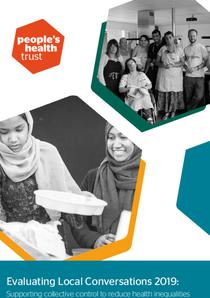Overview
This summary report details the evidence from the first two years of the evaluation. Research included detailed qualitative case studies with four Local Conversations across Great Britain. Surveys of the anchor organisations leading the process and of the residents participating locally, as well as peer research and self-evaluation that all contributed to the findings.
Overall, the evaluation has found that the programme has created a number of important improvements in the neighbourhoods involved. As a result of coming together through action, social connections both within and between groups of people have improved.
This has supported feelings of control to increase from the collective activity and bonds created, especially for those most closely involved. The evaluation also details improvements in inequalities experienced by the residents involved in regards to multiple factors impacting health.
Local Conversations neighbourhoods were found to have most prominently made improvements to their local environments and green spaces. There is also evidence to show residents made strong social connections through the programme, as well as increased levels of confidence, knowledge and skills.

Key findings
75% of survey respondents said they had made new friends through the Local Conversations programme;
62% of respondents said the Local Conversation programme had helped them develop new skills;
80% of respondents agree that when people in this area get involved in their community, they can really change the way that their area is run.
About the evaluation
New Economics Foundation independently evaluated the Local Conversation programme’s theory of change and its impact from 2016 to 2021. This second year Local Conversations evaluation was published in December 2019.
“You’ve got individuals who’ve never seen themselves as leaders in any way, shape or form, who are suddenly taking a lead.”

